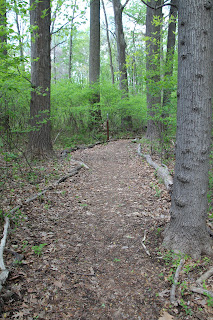The old dogwood leans forward
presenting perfection
-Sandra BurnsThe fourth of my monthly One Trail Twelve Times walks on the Beech Springs Trail was washed-out on Sunday afternoon, April 22. I was willing to walk to enjoy the trail in a rainy mood, but no one showed up, and I couldn't walk with my camera and take pictures at the same time for fear of getting the camera wet. So, I took some time to capture the fields and woods on a lunchtime walk a few days later. We'll start our walk in the meadows and woodland edge.
Flowering dogwoods (Cornus florida) nearing the end of their bloom
A tender sassafras leaf (Sassafras albidum) recently unfurled
Poison ivy (Toxicodendron radicans)
Field Speedwell (Veronica agrestis)
Common Strawberry (Fragaria virginiana)
One of the ever-more-common invasive bush honeysuckles (Lonicera spp.)
Eastern Tent Caterpillars (Malacosmos americanum) on a young black cherry (Prunus serotina)
Many multiflora rosebushes (Rosa multiflora) this year have become infected with rose rosette disease, a viral affliction that will eventually kill them (but which, unfortunately, also strikes commercial and ornamental roses).
Golden Ragwort (Senecio aureus), very common in the wet meadow
Young Red Maples (Acer rubrum)
Sensitive Fern (Onoclea sensibilis) in the wet meadow
Into the woods
Lush skunk cabbages (Symplocarpus foetidus) lining one of the Beech Spring runs
Mayapples (Podophyllum peltatum)
Mayapple flower
Green and grey Tuliptrees (Liriodendron tulipifera)
Virginia Spring-beauties (Claytonia virginica)
Jack-in-the-Pulpit (Arisaema triphyllum)





















4 comments:
Hi - I SO loved walking w/you today and I learned so much from you. :-)
Love Gail
peace.....
Thanks, Gail. Though you might not know it from some of the images, it was a mostly cloudy day; I even got sprinkled and thought about turning back--but am glad that I didn't.
All of this stuff looks very familiar : ) I like the style of your blog! Puts you right there and is very informative very quickly. The disease on the roses is interesting this year...I've noticed it as well. Score for native plants though! As an invasive species and a wall of thorns, I hate the MFer (haha Multi-Flora I mean) but as wildlife cover I really do appreciate it.
Thanks for the compliment, Doug. I'm envious of your photographic skills and your "eye." The less multiflora rose in North America, the better--I'm certainly with you about that, even though the birds in the hedgerow appreciate it for cover and for the niggardly winter food it provides. A real starvation food.
Post a Comment